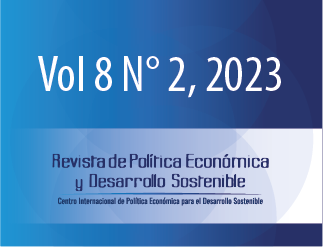Modernization of electricity rates in Costa Rica – towards the path of efficiency
DOI:
https://doi.org/10.15359/peds.8-2.2Keywords:
Effiency, Electricity, Policy prices, Public services, TariffAbstract
Costa Rica’s regulatory framework enabled the universalization and sustainability of the electricity system. The task ahead for the regulatory body and stakeholders in the sector is to achieve efficiency that translates into lower rates. The objective of this article is to assess the actions taken by the regulatory agency in the period 2016-2022 to take the sector towards the path of efficiency and to provide forward-looking considerations on the remaining tasks. To this end, it examines the context, the actions taken and their impact on the rates paid by users. The evidence shows that the measures adopted by the regulatory body in that period improved the efficiency of the sector and halted the upward trend in prices in 2019. On the other hand, it argues that, in the context of the new realities of a fast-evolving sector, the search for efficiency calls for changes in the approach to regulation, the role of regulated entities and assertive governance. Distribution companies must adopt a commercial approach to the services they provide, in line with the new realities, particularly the competition that technology introduces into the sector. There is a need for a regulation that is flexible, enables the adoption of new technology and is forward looking, as well assertive governance of the sector that includes comprehensive planning and optimization of the electric system with the objective of reducing its long-term costs and ensuring its sustainability.
References
Autoridad Reguladora de los Servicios Públicos [ARESEP] (2022). Datos abiertos. Precios medios. https://aresep.go.cr/datos-abiertos/precios-medios
Boyer, R. (2011). Poskeynesianos y regulacionistas: ¿Una alternativa a la crisis de la economía estándar? Economía: Teoría y práctica (35). México: Universidad Autónoma Metropolitana (UAM). https://doi.org/10.24275/ETYPUAM/NE/352011/Boyer
Comisión Económica para América Latina y el Caribe [CEPAL] (2014). Costa Rica: Estudio de tarifas de energía eléctrica, acceso, sostenibilidad e integración. Buenos Aires.
Comisión Económica para América Latina y el Caribe [CEPAL] (2017). Costa Rica: Revisión y actualización de la estructura tarifaria de distribución. Buenos Aires.
Jiménez-Gómez, R. (2011). Análisis de políticas para la reforma eléctrica de Costa Rica: Aplicación de redes de política y técnicas de prospectiva. Alemania: Editorial Académica Española (EAE). ISBN-13: 978-3844337655
Martínez-Piva, J.C. (2021). Cooperación y regulación de servicios públicos: La internacionalización de la regulación. Revista de la Autoridad Reguladora de Servicios Públicos, 7. San José, Costa Rica: ARESEP. ISSN: 2215-4787
Organización para la Cooperación y el Desarrollo Económicos [OCDE] (2012). Recomendación del Consejo sobre Política y Gobernanza Regulatoria. París: OECD Publishing. https://doi.org/10.1787/9789264209046-es
Organización para la Cooperación y el Desarrollo Económicos [OECD] (2020). Estudios Económicos de la OCDE: Costa Rica 2020. París: OECD Publishing. https://doi.org/10.1787/84cbb575-es
Rivera-Urrutia, E. (2004). Teorías de la regulación en la perspectiva de las políticas públicas. Gestión y Política Pública, 13(2). ISSN: 1405-1079. http://www.gestionypoliticapublica.cide.edu/num_anteriores/Vol.XIII_No.II_2dosem/Rivera.pdf
Stiglitz, J. (2010). Regulación y fallas. Revista de Economía Institucional, 12(23). Bogotá: Universidad Externado de Colombia. ISSN: 0124-5996. https://www.redalyc.org/pdf/419/41915521002.pdf







